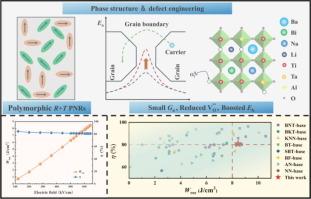通过相结构调制和缺陷工程,在无铅(Bi0.5Na0.5)TiO3 基弛豫铁电材料中实现折衷式高电容储能
IF 13.3
1区 工程技术
Q1 ENGINEERING, CHEMICAL
引用次数: 0
摘要
介质电容器是脉冲功率电子器件中的重要无源元件,由于其具有高热稳定性和低生产成本的巨大潜力,因此介质陶瓷被优先考虑。然而,由于电介质电容器的综合储能性能(ESP)较差,限制了其向小型化、轻量化和集成化方向的广泛发展,特别是通过环保的无铅方法。在此,我们采用相结构调制和缺陷工程之间的折中优化来提升无铅(Bi0.5Na0.5)TiO3 基陶瓷的 ESP。相结构调控调节了斜方(R)相和四方(T)相的比例,促进了宏域-纳米域的转变,从而促进了多态 R - T 极性纳米区域的共存。随后,通过缺陷工程策略,缺陷(如氧空位)和晶粒尺寸的减少、导电活化能的提高以及电气均匀性的增强共同促进了高击穿强度。这种级联效应产生了令人印象深刻的静电除尘器,最终在 640 kV/cm 下实现了 8.46 J/cm3 的大可回收能量密度和 80.8 % 的效率,同时还表现出对温度/频率/周期的稳健稳定性和令人满意的充放电性能。这项工作突出表明,通过相结构调制和缺陷工程进行折衷优化的方法是设计高性能无铅介电陶瓷的可靠途径。本文章由计算机程序翻译,如有差异,请以英文原文为准。

Compromise boosted high capacitive energy storage in lead-free (Bi0.5Na0.5)TiO3 −based relaxor ferroelectrics by phase structure modulation and defect engineering
Dielectric capacitors are vital passive components for pulsed power electronics and prioritize dielectric ceramics because of their great potential of high thermal stability and low cost in production. Nevertheless, the poor comprehensive energy storage performance (ESP) has limited their widespread development toward miniaturization, lightweight, and integration, especially via an eco-friendly lead-free approach. Herein, we adopt the compromise optimization between phase structure modulation and defect engineering to upgrade the ESP of lead-free (Bi0.5Na0.5)TiO3-based ceramics. The phase structure modulation regulates the ratio of rhombohedral (R) and tetragonal (T) phases and promotes the macrodomain- nanodomain transition, consequently fostering polymorphic R − T polar nanoregions coexistence. Subsequently, via defect engineering strategy, the reduction in defects (such as oxygen vacancies) and grain size, boost in conductivity activation energy, and enhancement in electrical homogeneity collectively promote high breakdown strength. This cascade effect generates impressive ESP, ultimately realizing a large recoverable energy density of 8.46 J/cm3 and efficiency of 80.8 % under 640 kV/cm, which also shows robust stabilities against temperature/frequency/cycle and satisfactory charging-discharging performance. This work highlights that the approach of compromise optimization via phase structure modulation and defect engineering is a robust pathway for the design of high-performance lead-free dielectric ceramics.
求助全文
通过发布文献求助,成功后即可免费获取论文全文。
去求助
来源期刊

Chemical Engineering Journal
工程技术-工程:化工
CiteScore
21.70
自引率
9.30%
发文量
6781
审稿时长
2.4 months
期刊介绍:
The Chemical Engineering Journal is an international research journal that invites contributions of original and novel fundamental research. It aims to provide an international platform for presenting original fundamental research, interpretative reviews, and discussions on new developments in chemical engineering. The journal welcomes papers that describe novel theory and its practical application, as well as those that demonstrate the transfer of techniques from other disciplines. It also welcomes reports on carefully conducted experimental work that is soundly interpreted. The main focus of the journal is on original and rigorous research results that have broad significance. The Catalysis section within the Chemical Engineering Journal focuses specifically on Experimental and Theoretical studies in the fields of heterogeneous catalysis, molecular catalysis, and biocatalysis. These studies have industrial impact on various sectors such as chemicals, energy, materials, foods, healthcare, and environmental protection.
 求助内容:
求助内容: 应助结果提醒方式:
应助结果提醒方式:


